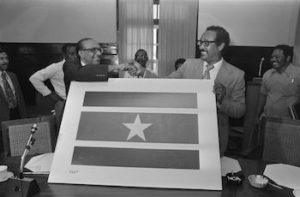
*On this date in 1975. Suriname gained complete independence from the Netherlands.
During World War II, on November 23, 1941, under an agreement with the Netherlands government-in-exile, the United States sent 2,000 soldiers to Suriname to protect the bauxite mines from supporting the Allies' war effort. In 1942, the Dutch government-in-exile reviewed the relations between the Netherlands and its colonies post-war. In 1954, Suriname became one of the constituent countries of the Kingdom of the Netherlands.
In 1974, the local government, led by the National Party of Suriname (NPS) (whose membership was largely Creole, started negotiations with the Dutch government leading toward complete independence on November 25, 1975. A large part of Suriname's economy for the first decade following independence was fueled by foreign aid from the Dutch government.
The first president of the country was Johan Ferrier. In the years leading up to independence, nearly one-third of the population of Suriname emigrated to the Netherlands amidst concern that the new country would fare worse under independence than it had as a constituent country of the Kingdom of the Netherlands. Surinamese politics degenerated into ethnic polarization and corruption soon after independence, with the NPS using Dutch aid money for partisan purposes. Its leaders were accused of fraud in the 1977 elections, in which Arron won a further term.
The discontent was such that many people fled to the Netherlands, joining the significant Surinamese community there. On February 25, 1980, a military coup overthrew Arron's government. It was initiated by a group of 16 sergeants led by Dési Bouterse. Opponents of the military regime attempted countercoups in April 1980, August 1980, March 15, 1981, and again on March 12, 1982. The dictatorship had all the coup leaders executed. The brutal civil war between the Suriname army and Maroons in 1986 continued, and its effects further weakened Bouterse's position during the 1990s. National elections were held in 1987.
His power began to wane after the 1991 elections. At the 1988 Summer Olympics, Suriname became the smallest independent South American state to win its first-ever Olympic medal as Anthony Nesty won gold in the 100-meter butterfly. Suriname is considered a culturally Caribbean country and is a member of the Caribbean Community (CARICOM). It is the only sovereign nation outside of Europe where Dutch is the official and prevailing language of government, business, media, and education. According to research by the Dutch Language Union, Dutch is the native language of 60% of Surinamese. Sranan Tongo, an English-based creole language, is a widely used lingua franca.